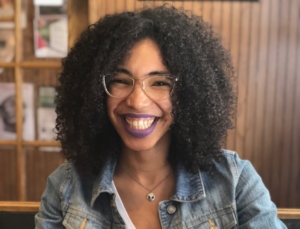 Dominique Rocker is finishing a Master of Arts in the Department of African American Studies at UCLA. Examining the writing and narrative resistance of Black Panther women in the 1970s, her work seeks to disrupt the prison industrial complex through the nexus of education, artistic outlets, and divingly feminine erotic healing. She will be continuing graduate work in the Department of History at Rutgers University, Newark in the Fall of 2020.
Dominique Rocker is finishing a Master of Arts in the Department of African American Studies at UCLA. Examining the writing and narrative resistance of Black Panther women in the 1970s, her work seeks to disrupt the prison industrial complex through the nexus of education, artistic outlets, and divingly feminine erotic healing. She will be continuing graduate work in the Department of History at Rutgers University, Newark in the Fall of 2020.
Read the following essay to learn more about her fascinating research and thesis:
The erotic, as described by Audre Lorde, is “a measure between the beginnings of our sense of self and the chaos of our strongest feelings.” It is a “deeply female and spiritual plane.” In a society historically and contemporarily constituted by the socio-political suppression of and control over Black women’s desire, agency, and feeling, the radical and often covert, intangible space between the self and the “chaos” of emotion is a “well of replenishing and provocative force” that holds the potential for radical change, perhaps outside the realm of legibility of the state. My scholarly endeavor is to uncover moments of agency in which Black women of the Black Power Era rooted their activism, whether consciously or not, in Lorde’s articulation of the erotic.[1]
As their partners and brothers were assassinated and jailed, as they themselves faced death penalty sentences, Black women in the late 1960s and 1970s engaged in political action, and used writing and storytelling that centered a divinely feminine power to create momentary visions and versions of freedom.
Activists such as Ericka Huggins used the erotic to discover “how acutely and fully we can feel in the doing.”[2] At the heart of my work is a curiosity not only about the hidden stories and resistance strategies of radical Black women in male-dominated spaces, but a desire to center emotion, sensuality, and joy as tools of survival for activists as well. This project this requires multidisciplinary training as well as mixed methodologies, specifically archival data, oral history, and Black feminist theories of kinship and the erotic.
As an interdisciplinary scholar trained in historical methods and cultural analysis, my work is rooted in counter-hegemonic orientations of history, the archive, resistance, and pleasure. My Master’s Paper explores the political murder & conspiracy trial of former Black Panther leader Ericka Huggins through an intersectional lens and takes into consideration both the narrative put upon her and the one she constructed for herself, a framework generally missing from work on this case. This research project centers the social, legal, and personal experience of Ericka Huggins as documented in newspaper archives, trial transcripts, and interviews to examine the ways in which oral history and personal storytelling through poetry written during incarceration can be pathways for personal and ideological abolitionist struggle. Huggins’ narrative resistance on the witness stand during her trial and in her poetry from prison offer meaningful insights into alternative modes of resistance and freedom-making. Considering the erotic as a powerful and “deeply female and spiritual plane,” my work renders politically engaged Black women visible and centers their survival and resistance through feeling.[3]
This work asks us to shift our understanding of historical moments, of police state violence and surveillance, and most intimately, of the meaning of freedom itself. Most importantly, for me, that has meant a centering of the divinely feminine erotic power that flows through the resistance work and the writings of some of the Panther Party’s less visible but most valuable: its women. When we begin to complicate the lens through which we understand the Black Power Era and the Black Panther Party, we can begin to uncover the nuances of not just revolution itself, but of the human experience of being Black and woman and poet and revolutionary.
[1] Audre Lorde, “Uses of the Erotic,” Sister Outsider: Essays and Speeches by Audre Lorde, (Berkeley: Crossing Press, 2007), 53-59.
[2] Lorde, “Uses of the Erotic.”
[3] Lorde, “Uses of the Erotic,” 53.


